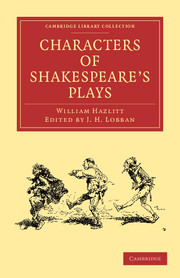Book contents
- Frontmatter
- Preface
- Contents
- Introduction
- Preface
- Cymbeline
- Macbeth
- Julius Cæsar
- Othello
- Timon of Athens
- Coriolanus
- Troilus and Cressida
- Antony and Cleopatra
- Hamlet
- The Tempest
- The Midsummer Night's Dream
- Romeo and Juliet
- Lear
- Richard II
- Henry IV
- Henry V
- Henry VI
- Richard III
- Henry VIII
- King John
- Twelfth Night; or, what you will
- The Two Gentlemen of Verona
- The Merchant of Venice
- The Winter's Tale
- All's Well That Ends Well
- Love's Labour's Lost
- Much Ado About Nothing
- As You Like It
- The Taming of the Shrew
- Measure for Measure
- The Merry Wives of Windsor
- The Comedy of Errors
- Doubtful plays of Shakespear
- Poems and Sonnets
- Notes
Introduction
Published online by Cambridge University Press: 07 September 2010
- Frontmatter
- Preface
- Contents
- Introduction
- Preface
- Cymbeline
- Macbeth
- Julius Cæsar
- Othello
- Timon of Athens
- Coriolanus
- Troilus and Cressida
- Antony and Cleopatra
- Hamlet
- The Tempest
- The Midsummer Night's Dream
- Romeo and Juliet
- Lear
- Richard II
- Henry IV
- Henry V
- Henry VI
- Richard III
- Henry VIII
- King John
- Twelfth Night; or, what you will
- The Two Gentlemen of Verona
- The Merchant of Venice
- The Winter's Tale
- All's Well That Ends Well
- Love's Labour's Lost
- Much Ado About Nothing
- As You Like It
- The Taming of the Shrew
- Measure for Measure
- The Merry Wives of Windsor
- The Comedy of Errors
- Doubtful plays of Shakespear
- Poems and Sonnets
- Notes
Summary
“One of the finest and wisest spirits breathing,” “one of the keenest and brightest critics that ever lived,” are Lamb's and Thackeray's famous tributes to the genius of William Hazlitt, a critic whom every critic delights to honour. With the steadily increasing interest that is now manifested in literary criticism, it is natural to find an ever increasing respect and admiration for the work of Hazlitt. In our own day he has well been called “the critics’ critic,” and the fitness of the designation has been generally allowed. In one not unimportant particular the eulogies of Hazlitt command special respect. No deduction has to be made from them, no allowance for the hyperbole of affection. His personality had little attraction for his contemporaries. They admired him in spite of himself. So, too, he appeals to his readers by virtue mainly of one quality-his sincere, enlightened, and passionate enthusiasm for the best in English literature. He is more than the critics’ critic just because of this union of enthusiasm and insight. To the critic he is suggestive no less when he is manifestly wrong than when he is most happily inspired, but scarcely less valuable is the other quality of his work which makes it for readers with no critical pretensions the most attractive and eloquent call to the love of books.
Information
- Type
- Chapter
- Information
- Characters of Shakespeare's Plays , pp. ix - xxivPublisher: Cambridge University PressPrint publication year: 2009First published in: 1908
